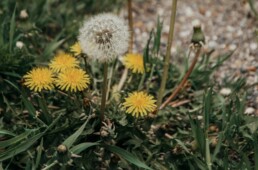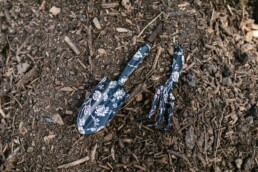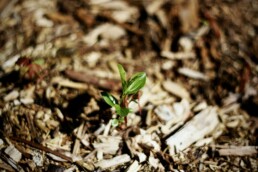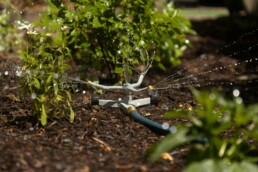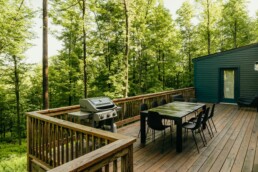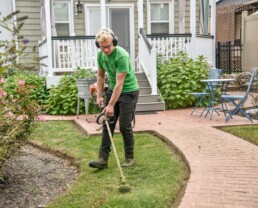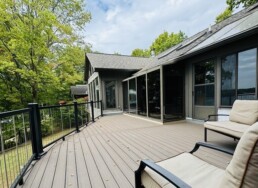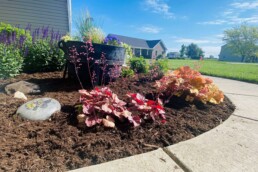How to Get Rid of Common Garden Weeds with Mulch
Weeds: the uninvited guests that just won’t leave. But don’t worry. There’s a clever way to keep those pesky common garden weeds at bay without breaking your back or your budget: mulch! Yes, that trusty, often overlooked garden hero can save the day. Here's your simple, step-by-step guide on how to use mulch to send weeds packing, and give your garden that polished, pristine look you’ve been dreaming of.
How to Get Rid of Common Garden Weeds
Step 1: Get the Right Mulch
First things first—it’s essential to choose the best kind for your garden. Greendell offers a range of mulches that not only look great but also do wonders for your soil (and your weed problem).
Why choose our mulch? It’s more than just eye candy. Our mulch helps retain moisture, regulates soil temperature, and, best of all, acts as an impenetrable barrier to weeds. A little goes a long way, and with our mulch delivery service, you’ll have it delivered straight to your door—no sweat.
Step 2: Clear the Area
Before you start laying down your mulch, you need a clean slate. While it’s tempting to toss mulch directly over the weeds, we promise it’ll be more effective if you do some prep work first.
- Pull existing weeds. Get your hands dirty and pull out as many weeds as possible, roots and all. The fewer weeds that remain, the better your results.
- Mow down tall weeds. If there are any stubborn weeds hanging around that you can’t get with your hands, give them a quick mow. You don’t need to make your garden look like a golf course, just trim down those tall invaders.
- Consider laying down landscaping fabric. For extra protection, you can use landscaping fabric to provide an additional layer of defense between the soil and the mulch. It’s like a secret weapon against weeds—think of it as mulch’s sidekick.
Step 3: Apply the Mulch (The Fun Part!)
Now for the fun part—putting down your mulch! Here’s how to do it right:
- Spread evenly. Use a rake or your hands (or both!) to spread a 2–3-inch layer of mulch across your garden beds. Make sure the mulch is evenly distributed to avoid patchy spots.
- Don’t pile up against plants. Keep mulch away from the stems or trunks of your plants and trees. You don’t want to suffocate them! Aim for a good, uniform layer around your plants, but leave a small gap near the base.
- Add a little extra mulch around weeds: For weeds that just won’t die, give them a little extra mulch love. Pile on a bit more mulch in those spots to ensure they get the message that it’s game over.
Step 4: Relax and Let Mulch Work Its Magic
Once the mulch is in place, kick back and enjoy the view. Your garden is now protected. The mulch will create a dense barrier that blocks sunlight from reaching weed seeds, preventing them from germinating. And, because it retains moisture, your plants won’t have to compete with weeds for water—it's a win-win!
Ready to Say Goodbye to Weeds? Let Greendell Help!
Getting rid of weeds doesn’t have to be a chore. With the right mulch, a little elbow grease, and some expert help, you’ll have your garden looking beautiful and weed-free in no time. Let’s get to work –– order Greendell mulch today to get started!
Mulch Landscaping Ideas: The Dos and Don’ts of Mulching
Mulch season is here, folks! It's that magical time of year when your yard gets a fresh coat of color, texture, and protection from the harsh elements. Want to get your mulching right this season? Here are a few key mulch landscaping ideas to start mulch season strong.
Mulch Landscaping Ideas—the Do’s and Don’ts of Mulching
Do Choose the Right Mulch for Your Garden
Mulch is not one-size-fits-all. There’s an entire world of mulch out there. When selecting mulch, consider your plant types, soil needs, and aesthetic preferences. Musselman offers a variety of mulch options to suit every need, ensuring your garden gets the perfect topping.
Don’t Pile Mulch Around Tree Trunks (No Mulch Volcanoes!)
We’ve all seen it—those towering mulch piles around tree trunks that resemble little volcanoes. While they may look harmless, they can actually harm your trees by trapping moisture and causing root rot. Instead, keep mulch a few inches away from the trunk and spread it evenly around the base.
Do Mulch Before the Heat Hits
Timing is everything! Mulch works its best when applied before summer’s scorching sun arrives. This helps insulate the soil and reduce water evaporation. So, don’t wait until your garden is in full bloom to get mulching—start early, and your plants will thank you!
Don’t Ignore the Soil Underneath
Mulch is a wonderful addition, but it can’t do it all on its own. Before you start mulching, make sure your soil is healthy and ready to thrive. Amend your soil with compost or organic matter as needed. A healthy soil foundation is key to long-lasting mulch success.
Do Mulch in the Right Amount
You don’t need a mountain of mulch to make a difference, but you do need enough to help your plants thrive. Aim for a 2- to 3-inch layer of mulch. Any more, and you risk smothering your plants. Any less, and you won’t reap the full benefits.
Don’t Mulch in the Rain
While a little drizzle is fine, heavy rain can turn mulch into a soggy mess. Wet mulch can compact, making it less effective at retaining moisture and potentially harming your plants. Wait for a dry day to spread your mulch, and it will stay in place and perform at its best.
Do Refresh Your Mulch Regularly
Mulch can break down over time, losing its color and effectiveness. To keep your garden looking fresh and vibrant, give it a mulch refresh every year. This also helps maintain its moisture retention and weed-blocking abilities.
Find Your Mulch Match at Greendell!
At Greendell, we believe mulch should do more than just look good—it should work hard for your garden, too. That’s why we offer premium-quality mulch that helps retain moisture, improve soil health, and, of course, add a touch of beauty to your landscape. Empty beds are NO fun. Contact Greendell today for expert advice and mulch delivery! Happy mulching!
The Benefits of Mulch: Why Your Garden Will Thank You
If your garden could talk, it would say, “More mulch, please!” Okay, maybe not in so many words, but mulching truly is one of the best things you can do for your plants. In fact, the benefits of mulch go far beyond making your outdoor spaces look polished and professional.
And, as mulch experts, we know a thing or two about why mulch is the MVP of garden care. Let’s break down why mulching is the ultimate garden game-changer and why you’ll want to stock up this season.
7 Essential Benefits of Mulch
1. Mulch Keeps Weeds in Check
Weeds are the uninvited guests at your garden party. But mulch helps create a barrier between sunlight and soil, preventing weed seeds from sprouting. That means less time pulling weeds and more time admiring your handiwork.
- A Greendell Tip: Lay down 2-3 inches of mulch for optimal weed control. Too much mulch, and those pesky weeds might sneak through.
2. Mulch Makes Moisture Management Easy
Your plants love water, but too much evaporation can leave them high and dry. Mulch acts like a sponge, helping the soil retain moisture and reducing the need for frequent watering. It’s a win-win for your plants and your water bill.
- A Greendell Tip: Organic mulches like wood chips or shredded bark are particularly good at locking in moisture while breaking down over time to enrich your soil.
3. Mulch Regulates Soil Temperature
Just like a good jacket, mulch helps your soil stay cozy in the winter and cool in the summer. This temperature regulation protects plant roots from extreme weather changes, keeping your garden healthier year-round.
- A Greendell Tip: Fall and winter are great times to add a thicker layer of mulch to protect your plants from freeze-thaw cycles.
4. Mulch Improves Soil Health
Think of mulch as a multivitamin for your garden. As organic mulches decompose, they release nutrients into the soil, improving its structure and fertility. Healthier soil means healthier plants.
- A Greendell Tip: Use high-quality mulch to maximize these soil-enriching benefits. We’ve got you covered with premium options.
5. Mulch Reduces Erosion
Heavy rain can wash away your soil, but mulch steps in as a protective shield. By covering bare soil, mulch minimizes the impact of raindrops and reduces the risk of erosion.
- A Greendell Tip: For sloped gardens, apply mulch carefully and secure it with landscaping fabric or netting for extra stability.
6. Mulch Boosts Curb Appeal
Mulch isn’t just functional; it’s fashionable! A fresh layer of mulch instantly upgrades the look of your garden beds, giving your outdoor space a polished, professional appearance. With different colored mulches, you can even customize your garden’s aesthetic.
- A Greendell Tip: Refresh your mulch annually to keep it looking vibrant and fresh. We can help you choose the perfect type for your landscape design.
7. Mulch Prevents Soil Compaction
Compacted soil can stifle plant growth, but mulch creates a cushion that absorbs the weight of foot traffic and heavy rain. This helps keep your soil light and airy, perfect for strong root development.
- A Greendell Tip: Apply mulch evenly and avoid piling it too close to plant stems or trunks to prevent rot.
Find Your Mulch Match with Musselman!
At Greendell, we’re not just passionate about mulch—we’re experts. Let’s make this mulch season the best one yet. Order your mulch delivery today or schedule a consultation at our showroom to make your mulch selection. We promise—your garden will thank you.
When to Mulch to Help Your Garden Thrive
Mulch—the unsung hero of gardens everywhere. You might think it’s just a fancy word for bark chips, but mulch is so much more. It’s your garden’s cozy blanket, its all-weather armor, and its secret sauce for thriving plants. But when it comes to mulching, timing is everything. Apply mulch at the wrong time, and you could do more harm than good. Don't worry. We’re here to guide you on when to mulch throughout the year to help your garden thrive.
When to Mulch: A Guide for Every Season
Spring: Mulch’s Time to Shine
Spring is the superstar season for mulching. As the soil warms up from its winter slumber, adding mulch helps retain warmth while keeping weeds from making an unwelcome appearance.
Here’s how to do it right:
- Wait for the thaw: If the ground is still frozen, hold off on mulching. Trapping cold soil beneath a layer of mulch can delay plant growth.
- Clean house: Clear away any old mulch, debris, or leftover leaves before laying down a fresh layer. Think of it as a spring cleaning for your garden beds.
- Spread wisely: Aim for about 2-3 inches of mulch. Too much, and your plants will suffocate. Too little, and weeds will have the last laugh.
Want to get a head start on your mulching? Order bulk delivery today.
Summer: Mulch as the Garden’s Sunscreen
As summer heats up, mulch steps up as your garden’s personal SPF. It keeps the soil cool, locks in moisture, and prevents your plants from drying out. If you mulched in spring, you’re golden! Just check if it needs a little top-up to maintain that protective layer. Remember, summer is about maintenance, not overhauls.
Fall: Mulching’s Undercover Operation
Fall mulching is less about show-stopping blooms and more about prepping your garden for the winter.
Here’s what to do:
- Wait for the drop: After the first hard frost, add a layer of mulch to insulate the soil and protect plant roots from the freeze-thaw cycles of winter.
- Go thicker: In fall, a 3–4-inch layer works best. This keeps your soil cozy without inviting pests to make a winter home.
- Use organic mulch: Materials like shredded leaves or straw work wonders as they break down over the winter and enrich your soil for spring.
Winter: To Mulch or Not to Mulch?
Winter mulching is like the cherry on top of your garden prep. If you didn’t get to it in the fall, it’s not too late to add a protective layer before the snow really piles up. Just remember: winter mulch is about insulation, not decoration. Keep it natural and focus on protecting perennials and shrubs.
Get Your Mulch Today!
As we gear up for spring, now is the time to find your mulch match with Greendell. Order ahead today to prep your spring order. Remember––empty beds are NO fun. So, grab a rake, and let mulch work its magic!
5 Deck Ideas for the Ultimate Backyard
Is your deck looking a little…sad? If your idea of a “fun outdoor space” is an old folding chair and a cracked table, we’ve got some better ideas. With a few tweaks and a little creativity, your deck can go from drab to fab in no time. Here are five deck ideas that’ll make you want to spend every moment outdoors—and maybe even cancel that trip to the beach.
5 Deck Ideas for the Ultimate Backyard
1. Multilevel Decks for Multifunctional Spaces
Why settle for one level when you can create a dynamic, multifunctional outdoor area? Multilevel decks divide your space into zones for different activities. Picture an upper-level dining area with a table and chairs, a mid-level lounge with comfortable seating, and a lower level for a hot tub or fire pit. Multilevel designs also help maximize yard space on sloped terrain, offering stunning visual interest and functionality.
Pro Tip: Use outdoor lighting strategically on steps and railings to enhance safety and add a warm, inviting glow in the evenings.
2. Outdoor Kitchen and Dining Deck
Bring the heart of the home outdoors with an outdoor kitchen and dining setup on your deck. A built-in grill, mini-fridge, and countertop space make alfresco cooking a breeze. Pair this with a sturdy dining table, chairs, and shade features like pergolas or umbrellas to create a welcoming space for entertaining.
Pro Tip: Use durable, weather-resistant materials like stainless steel for your appliances and treated wood or composite decking to withstand the elements.
3. Cozy Covered Decks
A covered deck is perfect for year-round use, protecting you from the sun, rain, or snow while still enjoying the fresh air. Whether it’s a simple awning, a full roof, or a retractable canopy, a covered deck provides versatility and comfort. Add cozy furnishings, string lights, and weather-proof textiles to create a snug atmosphere.
Pro Tip: Incorporate ceiling fans or heaters so your deck stays comfortable no matter the season.
4. Natural Integration with Landscaping
Blend your deck seamlessly with your backyard’s natural surroundings by integrating landscaping elements. Think built-in planters, wrap-around seating with greenery, or decks designed around existing trees. A deck designed to complement your yard’s flora can create a harmonious and tranquil space. Need help picking out the right plants to integrate with your deck? Check out the Greendell Garden Center.
Pro Tip: Use earthy tones and natural materials like stone accents or wood stains that mimic the colors of your garden.
5. Entertainment-Focused Decks
Turn your deck into the ultimate entertainment zone! Install features like a built-in bar, sound system, or outdoor TV for game nights and movie screenings. Add a fire pit surrounded by comfortable seating to keep guests cozy during cooler evenings.
Pro Tip: Opt for weatherproof technology and furniture to ensure durability and long-lasting fun.
Make Your Deck Dreams Come True
Your backyard deck gives you the opportunity to create a personal retreat tailored to your tastes and needs. Whether you prioritize entertaining, dining, or simply relaxing, there’s a design perfect for you.
Need help bringing your deck ideas to life? Contact us today for expert design and installation services, or stop by our showroom to see our selection of decking materials, and let’s turn your backyard into the ultimate outdoor escape.
How to Pick the Right Landscape Services This Spring
It may still be cold outside, but spring is just around the corner. Jumpstart your springtime garden refresh and find the right landscape services now to set the stage for a vibrant and functional yard when warmer days arrive.
Dreaming of a complete yard transformation? Simply need help with routine maintenance? With our guide, start your journey to find the best provider to bring your landscaping vision to life.
3 Steps to Guide Your Landscape Services Search
Step 1: Assess Your Needs
Before you begin searching for landscape services, take some time to assess what you need. Are you looking for a full-scale redesign? Ongoing lawn care? Or just have some specific tasks you need help with––like planting or mulching? Write down your priorities. Then, consider how much work you’re willing to handle yourself versus what you plan to leave to the professionals. Casting a realistic vision will help you find a provider with the right expertise and services.
Step 2: Know Your Budget
Landscaping projects can vary widely in cost. Avoid overspending by setting a reasonable budget based on the scope of your project and your financial comfort level. Remember to leave a little wiggle room for any unexpected costs. Pro tip: Take advantage of free consultations or quotes offered by providers to compare pricing and ensure your budget aligns with your landscaping plans.
Step 3: Research Your Options
Don’t simply commit to the first provider you find online. Use your extra time indoors this winter to research the landscape services in your area. Search through online reviews and social media or ask neighbors or friends for recommendations. Shop small and look local (like right here!) to guarantee a provider who’s familiar with your regional climate and plants. Take note that landscaping services vary dramatically. So, get to know each provider’s service offerings to ensure they cover what you’re looking for.
Look No Further for Landscape Services: We’re Here to Help!
Finding the right landscape services this spring doesn’t have to be daunting. With our guide, confidently select a provider that fits your vision.
In fact, we’ll give you a head start––look no further than right here. At Greendell, we bring local expertise and quality landscaping––directly to your front door. Schedule a visit to our showroom today to consult an expert and swipe right on your dream yard this spring.
7 Stunning Landscape Lighting Ideas for the Holidays
The holiday season is here, and it's time to bring the magic outside! Whether you're dreaming of a cozy glow or a bold, show-stopping display, these landscape lighting ideas will help you create a winter wonderland that’s the chatter of the neighborhood. From classic designs to eco-friendly solutions, here are seven dazzling ways to light up your yard this holiday season.
Here are 7 festive landscape lighting ideas for the holidays to bring your yard to life.
-
The Classic White Light Glow
For a timeless, elegant look, wrap warm, white lights around trees, bushes, and railings. This approach exudes charm and sophistication – and with a dusting of snow, it’s a scene straight out of a Hallmark movie. White lights are perfect for creating a clean, cohesive aesthetic that feels both festive and refined.
-
A Pathway Parade
Welcome guests with illuminated pathways. Stake holiday-themed lights like candy canes, snowflakes, or reindeer along walkways to guide the way. Practical and magical – who can resist?
-
The Bold Statement Tree
Elevate your outdoor lighting game by decorating your yard’s biggest tree. Oversized ornaments, large glowing lights, or even synchronized light displays can transform your yard into a destination! A bold statement tree is an instant attention-grabber and the perfect way to share the holiday spirit. Your neighbors will think a department store has set up camp in your front yard (in a good way, we promise).
-
A Colorful Canopy
Mix it up with vibrant, colorful lights! String them across bushes, rooflines, or pergolas to create a festive, party-ready atmosphere. Allow your yard its own pop-off moment this season!
-
Sparkle and Shine with Spotlights
Highlight your home’s best features by swapping regular spotlight bulbs with red or green ones. Shine them on wreaths, outdoor decorations, or architectural details for a subtle yet impactful holiday twist. Easy upgrade – transformative effect!
-
Icicle Lights for a Winter Wonderland
Dreaming of a white Christmas? Cue the icicle lights – your secret weapon – no matter the weather. Drape them along your roofline, fences, or porch railings to mimic the real thing’s frosty beauty (without the freezing temps and icy driveway). The shimmering effect is magical and perfect for creating the perfect winter wonderland vibe.
-
Customize Your Permanent Fixtures
Take your holiday lighting to the next level with permanent color-changing fixtures. These stunning lights can be customized for every season, from festive red and green for Christmas to spooky orange for Halloween or even your favorite team’s colors on game day. With smart controls, you can effortlessly switch between settings to suit any occasion, making them a versatile, year-round addition to your home.
Transform Your Yard with Holiday Spirit
The holidays are the perfect time to let your creativity shine! From classic white lights to bold, colorful displays, these landscape lighting ideas will help you make the season merry and bright.
Empty yards are no fun! So grab your lights, bring the glow outdoors, and create your own perfect winter oasis – filling both your home and heart with all the holiday feels. Need a referral to a Christmas light professional? We can help!
The Best Decking Materials for Your Yard
A deck is more than a place to store your grill – it's an extension of your home. Whether you’re upgrading an old deck or building a new one, adding a deck is no small investment. The decking material you choose will impact the look, feel, and functionality of your outdoor space, making the choice critical.
Not all decks are created equal, so to help you navigate the choices, we’ve gathered some of the top decking materials on the market.
3 of the Best Decking Materials for Your Yard
Wood Decking:
Classic and natural, wood decking brings warmth and beauty to any space. Wood is easy to work with and has a timeless appeal. However, without regular maintenance, it could start to rot, splinter, and welcome pests. For the best results, consider options like pressure-treated lumber, cedar, redwood, or tropical hardwoods. That said, while wood may need more upkeep than other materials, its natural charm is hard to beat.
Composite Decking:
Looking for low maintenance? Composite decking is a great choice. Made from a blend of wood fibers or aggregate and recycled plastic, composite decking is an eco-friendly alternative. Composite decking’s resistance to rot, mold, or splintering makes it a worthwhile investment over time. Plus, it doesn’t require staining or sealing and is available in a variety of colors and textures, many designed to mimic wood.
PVC Decking:
In rainy or humid climates, PVC decking is an excellent option. Made entirely from plastic, it’s moisture-resistant and ideal for damp environments. PVC is also easy to clean and won’t warp or fade as quickly in the sun. While it may have a more synthetic look, its durability and low maintenance needs make it appealing for those prioritizing longevity.
4 Questions to Ask When Picking Decking Materials:
Not sure which material is best for your needs? Here are four key questions to guide your decking journey:
- Durability: How durable does the material need to be for both climate and usage?
- Maintenance: How much maintenance am I willing to commit to?
- Budget: How does the upfront cost of the material compare to the long-term value?
- Look and Feel: Does this material fit my aesthetic vision?
And remember, for extra guidance, never hesitate to contact the trusted Greendell team for help. Happy Decking!
How to Plan Your Outdoor Lighting
The flower beds are freshly mulched — not a weed in sight. Now that you've put countless hours of energy into keeping that yard beautiful don’t let it get lost in the dark! Cue the outdoor lighting — immediately boosting curb appeal, safety, and the functionality of your yard. With the flip of a switch (and a bit of planning), let there be light. Here are four key steps to get started:
Four Steps to Plan Your Outdoor Lighting
1. Determine your Lighting Goals
Before you start picking out lights, take time to determine what specific goals you have in mind. Perhaps you have a long sidewalk leading to your front door, a firepit back in the woods, or a gorgeous bed of flowers lining your home’s entrance. Does your family enjoy late nights socializing around your outdoor dining set? Whatever layout your landscape has — plan your outdoor lighting for your family’s lifestyle.
2. Identify your Landscape’s Focal Points
Generally, outdoor lighting should make your space *pop*. Use it to highlight the areas of your yard and home that you’re most proud of. Basically, these are your landscape’s “focal points.” Here are a few spots that deserve some light:
- Pathways and Walkways: Adding path lights not only enhances safety but also creates a more inviting atmosphere.
- Unique Architectural Features: Got some cool brickwork or a distinct front door? Give them the spotlight they deserve.
- Water Features: A well-lit pond or fountain can transform into a stunning nighttime showpiece.
- Trees and Shrubs: Uplighting trees adds dramatic effect, giving your landscape texture and height.
3. Choose Which Types of Outdoor Lighting to Use
Then, it’s time to pick your light fixtures. Each option has its own function:
- Spotlights: Perfect for showcasing unique features, like that gorgeous maple tree in your yard.
- Path Lights: These low-level lights make walkways and driveways safer and easier to navigate.
- String Lights: To create a cozy, inviting vibe on your patio or deck, string lights are a must!
- Floodlights: Ideal for security, floodlights cover large areas and giving you added peace of mind.
4. Find the Right Landscape Lighting Professional
Finally, if the thought of wiring your yard or choosing the perfect lighting setup feels overwhelming, don’t worry — you don’t have to do it alone. When you hire a landscape lighting professional, you can make the process a breeze, ensuring your yard looks its absolute best — day and night. Greendell is here to help!
What Type of Mulch is the Best for Plant Growth?
Don't know which type of mulch is best for plant growth? Choosing mulch for your beds is more than just tossing something on the ground—it’s about giving your plants the ideal support to thrive. Different mulch types offer various benefits, and the best choice depends on your specific plants and garden goals. Here’s a breakdown of some top mulch options:
- Compost: This powerhouse mulch is rich in nutrients that can significantly boost plant growth. Although it may not offer the protective benefits of some of our other mulch option, it does enhance soil quality, making it an excellent choice for most gardens.
- Wood Mulch: Known for its longevity, wood mulch breaks down slowly, gradually enriching the soil while helping to retain moisture. It’s an effective and visually appealing option.
- Straw or Hay: Ideal for vegetable gardens, straw or hay mulch helps keep the soil moist and gives your garden a charming, rustic look. Just be cautious of any seeds that might be mixed in.
- Leaves: An easily accessible and effective mulch, shredded leaves can improve soil quality and serve as a protective layer during colder months.
When applying mulch, aim for a thickness of 2-4 inches to get the full benefit without overwhelming your plants. Keep mulch away from plant stems to avoid issues like root rot.
Remember, organic mulches decompose over time, enriching your soil and requiring periodic replenishment. Your garden can become a thriving, beautiful space with the right mulch. Empty beds are NO fun!
